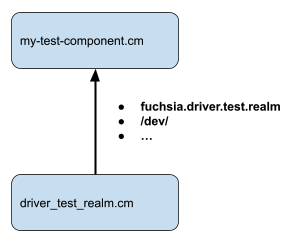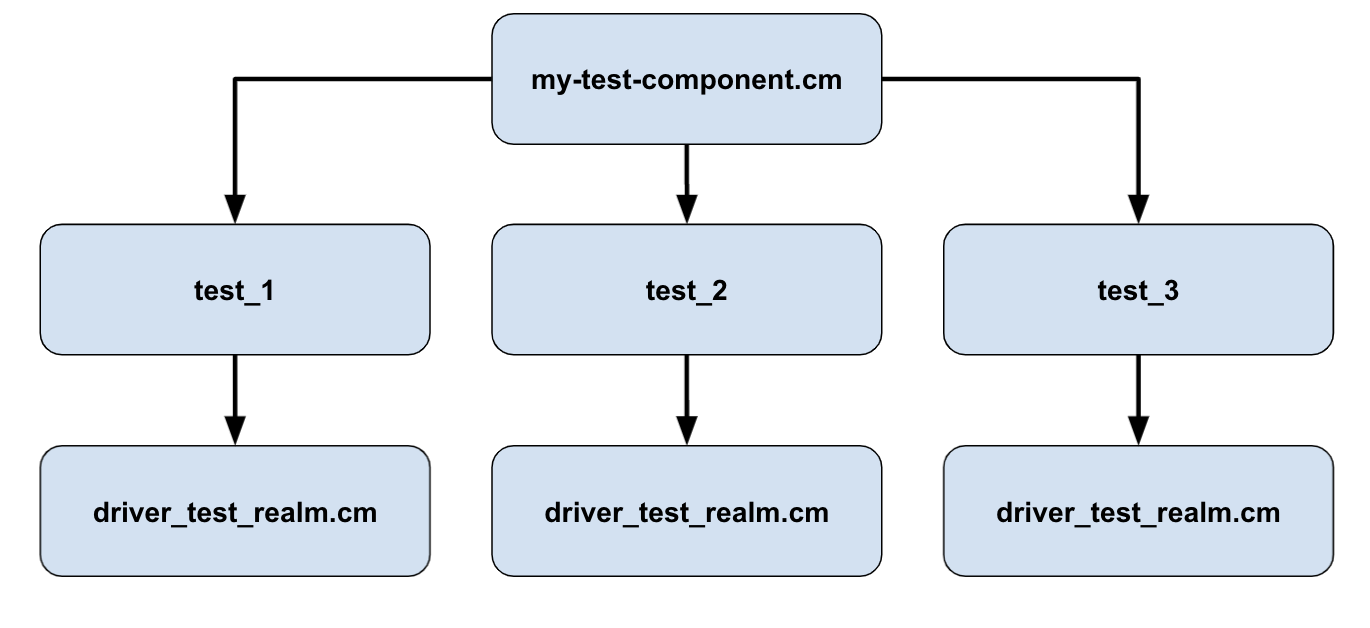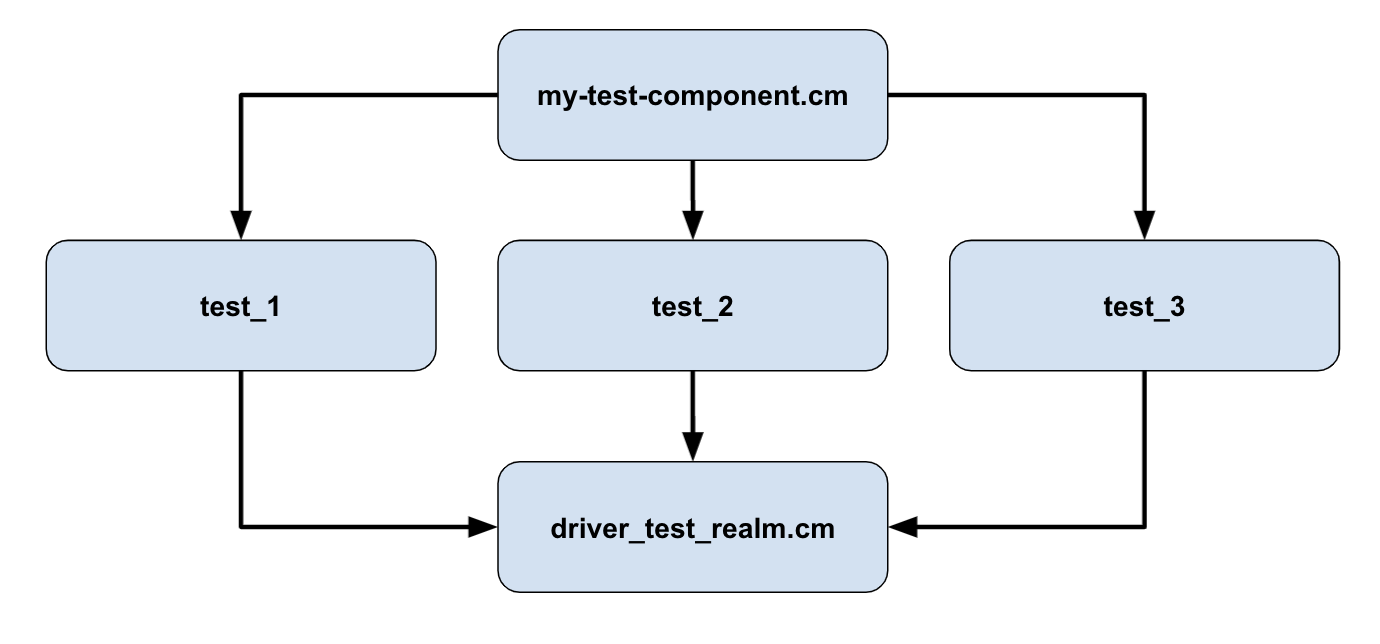A driver integration testing framework
DriverTestRealm is an integration testing framework that runs drivers in a hermetic environment. It is useful for driver authors to test their drivers, and for system developers to run integration tests that use specific driver stacks. DriverTestRealm provides a hermetic version of all of the Driver Frameworks APIs, and provides an environment that is nearly identical to a running system.
DriverTestRealm is for integration testing. For a light weight unit testing framework, use the unit testing library instead.
Overview of DriverTestRealm
DriverTestRealm is a component that your test can access. This component contains all of the DriverFramework's components, like DriverManager and DriverIndex. It mocks out all of the capabilities these components need.

DriverTestRealm exposes the
fuchsia.driver.test/Realm protocol
which is used to start the DriverTestRealm. The Start function takes arguments
which can be used to configure things like which drivers are loaded, the root
driver, and how DriverManager shuts down. Start can only be called once per
component; if a new DriverTestRealm is needed for each test, then RealmBuilder
must be used.
Interacting with drivers
See Using Services with DriverTestRealm.
Including drivers
By default, the DriverTestRealm component loads drivers from its own package. The test author must be sure to include all the drivers in the test package that they expect to load.
Binding drivers
By default, the root driver for DriverTest realm is the test-parent driver. That means that in order to bind a driver, you should create a mock driver that binds to the test parent. This can be accomplished with the following bind rules:
fuchsia.BIND_PROTOCOL == fuchsia.test.BIND_PROTOCOL.PARENT;
Your mock driver can then add a device with the right properties so that your driver-under-test will bind to the mock driver.
Hermetic vs Non-Hermetic
There are two different ways of using DriverTestRealm. It can be used hermetically or non-hermetically.
Hermetic
In the hermetic version of Driver Test Realm every test gets its own version of the Driver Test Realm component. This means every test is hermetic, or isolated, from the other tests. Tests will not share any state, as each Driver Test Realm is unique to that test.

Using a hermetic Driver Test Realm may be slower as each test has to spawn and setup new components.
Non Hermetic
The non-hermetic way of using Driver Test Realm is to have a single Driver Test Realm child component that is shared between every test instance.

The test author needs to be extra careful to make sure that their driver's state is cleared between each tests so that the individual tests do not interact with each other.
Using a non-hermetic Driver Test Realm may be much faster since each test does not need to spawn and setup new components. The test code may also be simpler.
DriverTestRealm examples
Here are some examples of using DriverTestRealm hermetically and non-hermetically, in both C++ and Rust.
The examples can be seen at //examples/drivers/driver_test_realm/.
Hermetic
Test authors can use RealmBuilder to create a new DriverTestRealm for each test. The DriverFramework has provided a helpful library using DriverTestRealm in RealmBuilder.
Here's an example BUILD.gn file for using DriverTestRealm with RealmBuilder.
Notice that there's a specific DriverTestRealm GN target to depend on so the
test's generated CML has the correct RealmBuilder permissions.
C++
test("driver_test_realm_example_hermetic_cpp") {
sources = [ "test.cc" ]
deps = [
"//examples/drivers/driver_test_realm/sample_driver:fuchsia.hardware.sample_cpp",
"//sdk/fidl/fuchsia.driver.test:fuchsia.driver.test_cpp",
"//sdk/lib/async-loop",
"//sdk/lib/async-loop:async-loop-cpp",
"//sdk/lib/component/outgoing/cpp",
"//sdk/lib/device-watcher/cpp",
"//sdk/lib/driver_test_realm/realm_builder/cpp",
"//src/lib/fxl/test:gtest_main",
"//src/lib/testing/loop_fixture",
"//zircon/system/ulib/fbl",
]
}
fuchsia_unittest_package("package") {
package_name = "driver_test_realm_example_hermetic_cpp"
deps = [
# Include your test component.
":driver_test_realm_example_hermetic_cpp",
# Include the driver(s) you will be testing.
"//examples/drivers/driver_test_realm/sample_driver",
# Include the test parent (if your driver binds to it).
"//src/devices/misc/drivers/test-parent",
]
}
Rust
rustc_test("driver_test_realm_example_realm_builder_rust") {
edition = "2024"
testonly = true
source_root = "test.rs"
sources = [ "test.rs" ]
deps = [
"//examples/drivers/driver_test_realm/sample_driver:fuchsia.hardware.sample_rust",
"//sdk/fidl/fuchsia.driver.test:fuchsia.driver.test_rust",
"//sdk/lib/device-watcher/rust",
"//sdk/lib/driver_test_realm/realm_builder/rust",
"//src/lib/fuchsia-async",
"//src/lib/fuchsia-component-test",
"//third_party/rust_crates:anyhow",
]
}
fuchsia_unittest_package("package") {
package_name = "driver_test_realm_example_realm_builder_rust"
deps = [
# Include your test component.
":driver_test_realm_example_realm_builder_rust",
# Include the driver(s) you will be testing.
"//examples/drivers/driver_test_realm/sample_driver",
# Include the platform bus (if your driver binds to it).
"//src/devices/bus/drivers/platform:platform-bus",
# Include the test parent (if your driver binds to it).
"//src/devices/misc/drivers/test-parent",
]
# There's expected error logs that happen due to races in driver enumeration.
test_specs = {
log_settings = {
max_severity = "ERROR"
}
}
}
Here's test code that spawns a new DriverTestRealm per test.
C++
class DriverTestRealmTest : public gtest::TestLoopFixture {};
TEST_F(DriverTestRealmTest, DriversExist) {
async::Loop loop(&kAsyncLoopConfigNeverAttachToThread);
loop.StartThread("bg");
// Create and build the realm.
auto realm_builder = component_testing::RealmBuilder::Create();
driver_test_realm::Setup(realm_builder, loop.dispatcher(), driver_test_realm::Options{},
fuchsia_driver_test::RealmArgs{});
auto realm = realm_builder.Build(loop.dispatcher());
auto boot_result = driver_test_realm::WaitForBootup(realm);
ASSERT_EQ(ZX_OK, boot_result.status_value());
fbl::unique_fd fd;
auto exposed = realm.component().CloneExposedDir();
ASSERT_EQ(ZX_OK, fdio_fd_create(exposed.TakeChannel().release(), fd.reset_and_get_address()));
// Wait for driver.
auto node = driver_test_realm::WaitForNode(realm, "dev.sys.test.sample_driver");
ASSERT_TRUE(node.is_ok());
// TODO(https://fxbug.dev/377735979): Connect using a different mechanism.
zx::result channel =
device_watcher::RecursiveWaitForFile(fd.get(), "dev-topological/sys/test/sample_driver");
ASSERT_EQ(channel.status_value(), ZX_OK);
fidl::ClientEnd<fuchsia_hardware_sample::Echo> client(std::move(*channel));
// Send a FIDL request.
constexpr std::string_view sent_string = "hello";
fidl::WireResult result =
fidl::WireCall(client)->EchoString(fidl::StringView::FromExternal(sent_string));
ASSERT_EQ(ZX_OK, result.status());
ASSERT_EQ(sent_string, result.value().response.get());
driver_test_realm::ShutdownRealm(realm);
}
Rust
#[fasync::run_singlethreaded(test)]
async fn test_sample_driver() -> Result<()> {
// Create the RealmBuilder.
let builder = RealmBuilder::new().await?;
builder.driver_test_realm_setup().await?;
// Build the Realm.
let instance = builder.build().await?;
// Start DriverTestRealm
instance.driver_test_realm_start(fdt::RealmArgs::default()).await?;
// Connect to our driver.
let dev = instance.driver_test_realm_connect_to_dev()?;
let driver =
device_watcher::recursive_wait_and_open::<fidl_fuchsia_hardware_sample::EchoMarker>(
&dev,
"sys/test/sample_driver",
)
.await?;
// Call a FIDL method on the driver.
let response = driver.echo_string("Hello world!").await.unwrap();
// Verify the response.
assert_eq!(response, "Hello world!");
Ok(())
}
#[fasync::run_singlethreaded(test)]
async fn test_platform_bus() -> Result<()> {
// Create the RealmBuilder.
let builder = RealmBuilder::new().await?;
builder.driver_test_realm_setup().await?;
// Build the Realm.
let instance = builder.build().await?;
// Start DriverTestRealm.
let args = fdt::RealmArgs {
root_driver: Some("fuchsia-boot:///platform-bus#meta/platform-bus.cm".to_string()),
..Default::default()
};
instance.driver_test_realm_start(args).await?;
// Connect to our driver.
let dev = instance.driver_test_realm_connect_to_dev()?;
device_watcher::recursive_wait(&dev, "sys/platform").await?;
Ok(())
}
Non Hermetic
Here's a basic example of a test that starts a DriverTestRealm component and then connects
to /dev to see a driver that has been loaded.
First, it's important that the build rules are set up correctly. The test package needs to contain the DriverTestRealm component, as well as any drivers that are going to be loaded. Adding drivers to the package will automatically make those drivers visible to DriverTestRealm.
C++
test("driver_test_realm_example_non_hermetic_cpp") {
sources = [ "test.cc" ]
deps = [
"//sdk/fidl/fuchsia.driver.test:fuchsia.driver.test_cpp",
"//sdk/lib/component/incoming/cpp",
"//sdk/lib/device-watcher/cpp",
"//sdk/lib/driver_test_realm:static",
"//sdk/lib/syslog/cpp",
"//third_party/googletest:gtest",
]
}
fuchsia_unittest_package("package") {
package_name = "driver_test_realm_example_non_hermetic_cpp"
deps = [
":driver_test_realm_example_non_hermetic_cpp",
# Add drivers to the package here.
# The test-parent driver is the default root driver for DriverTestRealm.
"//src/devices/misc/drivers/test-parent",
]
}
Here's what the test setup would look like. Notice that you have to call
fuchsia.driver.test/Realm:Start before your test framework is run. The
arguments to Start can be setup to configure the DriverManager implementation.
C++
TEST(DdkFirmwaretest, DriverWasLoaded) {
zx::result channel = device_watcher::RecursiveWaitForFile("/dev/sys/test");
ASSERT_EQ(channel.status_value(), ZX_OK);
}
int main(int argc, char **argv) {
fuchsia_logging::LogSettingsBuilder builder;
builder.WithTags({"driver_test_realm_test"}).BuildAndInitialize();
// Connect to DriverTestRealm.
auto client_end = component::Connect<fuchsia_driver_test::Realm>();
if (!client_end.is_ok()) {
FX_LOG_KV(ERROR, "Failed to connect to Realm FIDL", FX_KV("error", client_end.error_value()));
return 1;
}
fidl::WireSyncClient client{std::move(*client_end)};
// Start the DriverTestRealm with correct arguments.
auto wire_result = client->Start(fuchsia_driver_test::wire::RealmArgs());
if (wire_result.status() != ZX_OK) {
FX_LOG_KV(ERROR, "Failed to call to Realm:Start", FX_KV("status", wire_result.status()));
return 1;
}
if (wire_result.value().is_error()) {
FX_LOG_KV(ERROR, "Realm:Start failed", FX_KV("status", wire_result.value().error_value()));
return 1;
}
// Run the tests.
::testing::InitGoogleTest(&argc, argv);
return RUN_ALL_TESTS();
}
Notice that once DriverTestRealm has been started the test environment has
all of DriverFramework's APIs available to it in its component namespace.
The /dev/ directory can be watched and opened to connect to drivers.
Simple example
The Simple library lets a test use DriverTestRealm with the default arguments.
Most integration tests are fine with DriverTestRealm's default configuration; they don't need to pass arguments to Start. If this is the case, then SimpleDriverTestRealm starts automatically.
C++
test("driver_test_realm_example_simple_cpp") {
sources = [ "test.cc" ]
deps = [
"//sdk/lib/device-watcher/cpp",
"//sdk/lib/driver_test_realm/simple",
"//src/lib/fxl/test:gtest_main",
]
}
fuchsia_unittest_package("package") {
package_name = "driver_test_realm_example_simple_cpp"
deps = [ ":driver_test_realm_example_simple_cpp" ]
}
Rust
rustc_test("driver_test_realm_example_simple_rust") {
edition = "2024"
source_root = "test.rs"
sources = [ "test.rs" ]
deps = [
"//sdk/lib/device-watcher/rust",
"//sdk/lib/driver_test_realm/simple",
"//src/lib/fuchsia-async",
"//src/lib/fuchsia-fs",
"//third_party/rust_crates:anyhow",
]
}
fuchsia_unittest_package("package") {
package_name = "driver_test_realm_example_simple_rust"
deps = [ ":driver_test_realm_example_simple_rust" ]
}
The test looks identical except that it doesn't need to set up a main function
to call fuchsia.driver.test/Realm:Start.
C++
TEST(SimpleDriverTestRealmTest, DriversExist) {
zx::result channel = device_watcher::RecursiveWaitForFile("/dev/sys/test");
ASSERT_EQ(channel.status_value(), ZX_OK);
}
Rust
#[fasync::run_singlethreaded(test)]
async fn test_driver() -> Result<()> {
let dev = fuchsia_fs::directory::open_in_namespace("/dev", fuchsia_fs::Flags::empty())?;
device_watcher::recursive_wait(&dev, "sys/test").await?;
Ok(())
}
Common Issues:
- A driver isn't binding
- Make sure the driver is being included in the package
- Make sure
src/devices/misc/drivers/test-parentis included if the default root driver is being used.
- Calls to /dev/ are hanging
- Make sure
fuchsia.driver.test/Realm:Startis called.
- Make sure
fuchsia.driver.test/Realm:Startreturns ZX_ERR_ALREADY_BOUND- Start can only be called once per component. If you want a new DriverTestRealm per test, please see the RealmBuilder section.
